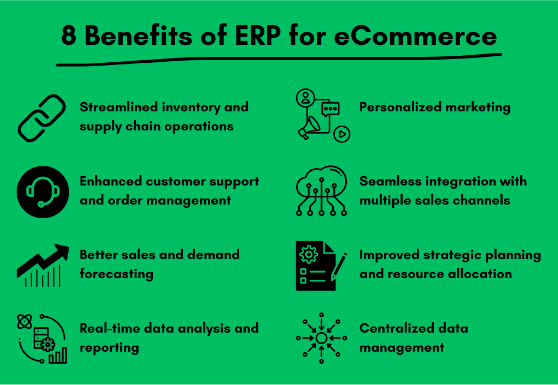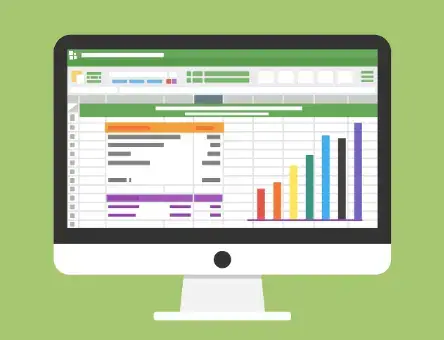Enterprise resource planning (ERP) software connects your key processes, allowing you to grow and manage your eCommerce business more effectively.
According to a Software Path report, the primary reason for implementing ERP software is to support growth.
ERP for eCommerce offers a range of benefits to businesses of all sizes. In this guide, we'll explore eight of these to help you decide if it’s right for you.
Top 8 Benefits of ERP for ECommerce:
- Streamlined inventory and supply chain operations
- Personalized marketing
- Enhanced customer support and order management
- Seamless integration with multiple sales channels
- Better sales and demand forecasting
- Improved strategic planning and resource allocation
- Real-time data analysis and reporting
- Centralized data management
ERP software has many benefits for eCommerce companies. It can streamline workflows, automate manual processes, and give greater visibility into your business.
It’s true that ERP implementation costs time and money. But with careful planning and the right solution, you’ll get your investment back—and more.
Below are just some of the benefits you can see.

1. Streamlined inventory and supply chain operations
Supply chain management encompasses a range of processes, from staying on top of suppliers and warehouses to customer service. Depending on your company's size, you may need to manage multiple locations worldwide.
Rev.io PSA streamlines your business operations by providing a unified platform for managing tasks efficiently. It offers real-time visibility, enhancing your ability to monitor and optimize your processes.
You can optimize workflows, reduce inventory and shipping costs, and scale your business effectively.
Key features include:
- Stock movements and import tracking
- Product data
- Quality control
- Supplier management and invoicing
- Pricing and discounts
- Purchase orders and delivery
- Order release and returns
2. Personalized marketing
Many cloud ERP systems, such as Oracle NetSuite, include customer relationship management built in or as an add-on, enabling them to store large volumes of customer data. It includes contact details, purchase history, preferences, and more.
You can use this to personalize your marketing strategy and deliver a better customer experience.
You can also see which items are most popular with which customers, ensuring you don’t waste resources marketing to the wrong segments. Additionally, you can use this information to personalize upselling and cross-selling, boosting your revenue potential.
3. Enhanced customer support and order management
ERP software includes a range of sales order management features. It means you will consistently deliver the right items at the right time to your customers.
You’ll have instant access to order information, carriers, price lists, and discounts, helping you streamline your performance and boost efficiency.
Plus, with access to a range of customer data—including past interactions—you can quickly resolve customer service requests.
Customers will be happier, and your team can gather valuable data to improve their experience.
Key features include:
- Customer returns and invoicing
- Contact management
- Salesforce automation
- Credit checking and order entry
- A knowledge base
- Open orders and contracts
- Order picking and packing, shipping, and delivery
- Call center support
4. Seamless integration with multiple sales channels
If you're looking at capitalizing on omnichannel marketing, you can’t go wrong with an ERP eCommerce solution.
For example, say a customer orders a shirt from your website and opts to collect it from your store. Your in-store employees can instantly view the order details and ensure it’s ready and waiting when the customer comes to collect.
Then, they can update the system so that all the necessary information is readily visible if the customer needs to return the shirt.
5. Better sales and demand forecasting
Since cloud ERP systems centralize your data, you can also easily view historical and real-time information. It helps you identify trends and make more informed decisions.
Plus, you can use this data to create accurate sales and demand forecasts.
With more accurate forecasts, you can ensure you always have the right amount of stock to meet demand without losing costly excess inventory. This software also lets you analyze forecasting errors and create reports you can share with your team.

6. Improved strategic planning and resource allocation
Strategic planning involves setting goals, creating a roadmap, and allocating resources. To do this effectively, you’ll likely require large amounts of data. An ERP solution provides this.
Using data from your ERP, you can identify opportunities and risks and develop a realistic plan to achieve your goals. Plus, you can review your company’s operations to allocate resources more efficiently, helping reduce waste.
7. Real-time data analysis and reporting
A significant benefit of cloud ERP solutions is their real-time data analysis and reporting capabilities. All departments will have access to the latest information, enabling better decision-making.
You can track your KPIs in real-time, so you’ll instantly know if there’s a problem. It’s also easy to generate reports with key stakeholders.
For example, you can analyze your supply chain operations to identify bottlenecks. Then, you can create a report, share it with your suppliers and distributors, and work together to improve efficiency.

8. Centralized data management
As we said, ERP for eCommerce businesses integrates critical data to provide a centralized view of your company. It breaks down silos and enables data to flow freely throughout your organization.
When everyone works with the same data, errors or duplicated work are less likely. So you can be confident you’re basing your decisions on accurate, up-to-date information. That’s vital if you’re to grow your business successfully.
Takeaways
ERP software unifies your eCommerce business processes by creating a single source of truth. You'll get real-time visibility into every aspect of your operation, from supply chain management to marketing and customer relationship management.
With ERP for eCommerce, you can make better decisions and allocate resources where needed. Plus, when you pair ERP with these nine essential POWR apps, it's easy to grow your online business and give customers a great experience.
Frequently Asked Questions About ERP for eCommerce
1. What is ERP software for eCommerce?
ERP (Enterprise Resource Planning) software for eCommerce is a centralized system that helps online businesses manage core operations, including inventory, orders, customer data, accounting, and supply chain processes. By integrating these functions into a single platform, ERP software improves efficiency, visibility, and decision-making.
2. Is ERP software only suitable for large eCommerce businesses?
No. While ERP systems were traditionally used by large enterprises, many modern cloud-based ERP solutions are also designed for small and mid-sized eCommerce businesses. These scalable systems allow growing companies to start with essential features and expand functionality as their operations become more complex.
3. How does ERP improve inventory management for eCommerce?
ERP software provides real-time visibility into inventory levels across warehouses and sales channels. This helps prevent stockouts and overstocking, improves demand forecasting, and ensures accurate order fulfillment. Automated stock updates also reduce manual errors and save time.
4. Can ERP software integrate with existing eCommerce platforms and tools?
Yes. Most ERP solutions integrate with popular eCommerce platforms, marketplaces, payment systems, and marketing tools. This allows businesses to manage multiple sales channels from one dashboard while keeping customer, order, and inventory data synchronized.
5. What should eCommerce businesses consider before implementing ERP?
Before implementing an ERP system, businesses should evaluate their current pain points, growth plans, budget, and technical requirements. It’s also important to choose an ERP solution that supports integrations, offers scalability, and provides strong reporting capabilities to ensure long-term value.


